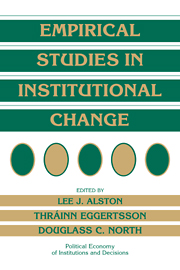Book contents
- Frontmatter
- Contents
- List of contributors
- Series editors' preface
- Acknowledgments
- Introduction
- A note on the economics of institutions
- Empirical work in institutional economics: an overview
- 1 Toward an understanding of property rights
- Economic variables and the development of the law: the case of western mineral rights
- 2 Impediments to institutional change in the former Soviet system
- Why economic reforms fail in the Soviet system: a property rights–based approach
- 3 Transaction costs and economic development
- Public institutions and private transactions: a comparative analysis of the legal and regulatory environment for business transactions in Brazil and Chile
- 4 The evolution of modern institutions of growth
- Constitutions and commitment: the evolution of institutions governing public choice in seventeenth-century England
- 5 Regulation in a dynamic setting
- The political economy of controls: American sugar
- 6 Price controls, property rights, and institutional change
- Roofs or stars: the stated intents and actual effects of a rents ordinance
- 7 Regulating natural resources: the evolution of perverse property rights
- Legally induced technical regress in the Washington salmon fishery
- 8 The politics of institutional change in a representative democracy
- A political theory of the origin of property rights: airport slots
- 9 The economics and politics of institutional change
- Paternalism in agricultural labor contracts in the U.S. South: implications for the growth of the welfare state
- Epilogue: economic performance through time
- Author index
- Subject index
- POLITICAL ECONOMY OF INSTITUTIONS AND DECISIONS
Introduction
Published online by Cambridge University Press: 05 June 2012
- Frontmatter
- Contents
- List of contributors
- Series editors' preface
- Acknowledgments
- Introduction
- A note on the economics of institutions
- Empirical work in institutional economics: an overview
- 1 Toward an understanding of property rights
- Economic variables and the development of the law: the case of western mineral rights
- 2 Impediments to institutional change in the former Soviet system
- Why economic reforms fail in the Soviet system: a property rights–based approach
- 3 Transaction costs and economic development
- Public institutions and private transactions: a comparative analysis of the legal and regulatory environment for business transactions in Brazil and Chile
- 4 The evolution of modern institutions of growth
- Constitutions and commitment: the evolution of institutions governing public choice in seventeenth-century England
- 5 Regulation in a dynamic setting
- The political economy of controls: American sugar
- 6 Price controls, property rights, and institutional change
- Roofs or stars: the stated intents and actual effects of a rents ordinance
- 7 Regulating natural resources: the evolution of perverse property rights
- Legally induced technical regress in the Washington salmon fishery
- 8 The politics of institutional change in a representative democracy
- A political theory of the origin of property rights: airport slots
- 9 The economics and politics of institutional change
- Paternalism in agricultural labor contracts in the U.S. South: implications for the growth of the welfare state
- Epilogue: economic performance through time
- Author index
- Subject index
- POLITICAL ECONOMY OF INSTITUTIONS AND DECISIONS
Summary
In recent years scholars and policy makers alike have paid increasing attention to the complex relationship between social institutions and economic performance. There are various reasons why it is important to understand the role of institutions: economic stagnation in many developing countries; structural problems in the old industrial economies; and the collapse of the soviet economies of the former Soviet Union, Central Asia, and Eastern and Central Europe. Institutional analysis is of paramount importance for guiding the transition to markets in formerly centrally managed economies. Many scholars now recognize that mainstream economic analysis, neoclassical economics, is of little help in restructuring economies that lack secure markets; the same criticism holds for other disciplines in the social sciences.
An interdisciplinary research program that deals explicitly with the link between institutions, institutional change, and economic performance is now emerging. The new institutional analysis is a line of investigation that departs from but does not abandon neoclassical economics. Central to the research agenda is an emphasis on property rights, the transaction costs of measurement and enforcement, and incomplete information. The research program has been further enriched through cross-fertilization with law, political science, sociology, anthropology, and history.
Although both theoretical and empirical contributions to this field are accumulating at an increasing rate and two pioneers of the approach recently received the Nobel Prize in Economics (R. H. Coase in 1991; D. C. North in 1993), the impression persists that the field is long on theoretical analysis but short on empirical work.
- Type
- Chapter
- Information
- Empirical Studies in Institutional Change , pp. 1 - 5Publisher: Cambridge University PressPrint publication year: 1996
- 2
- Cited by



